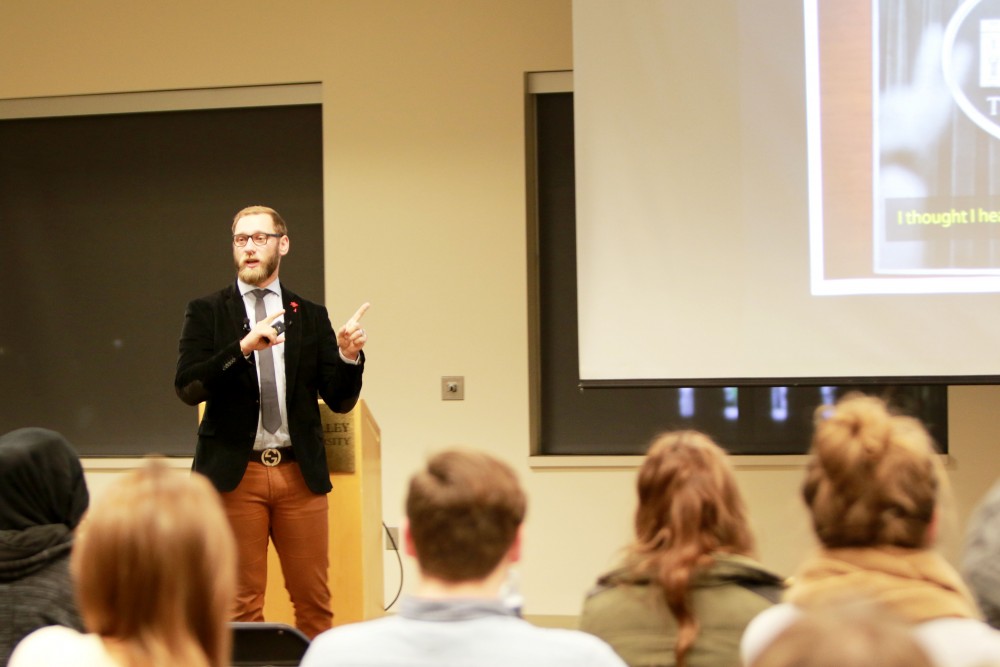‘The time to act is now’

GVL / Sara Carte Eric Paul Leue presents “How to Survive End A Plague” for World AIDS day in the Kirkhof building on Dec. 1.
Dec 2, 2015
In honor of World AIDS Day on Tuesday, Grand Valley State University invited Eric Paul Leue to give a presentation about HIV risks and prevention.
“Universities and schools are hubs for information and knowledge,” Leue said. “Sex is something that we all do at some points of our lives. It’s important to also provide knowledge and education surrounding sexual health.”
The 28-year-old began his advocacy 11 years ago. Leue has lost a number of loved ones to the epidemic, which contributed to his inspiration to raise awareness about what, to him, is a plague.
“Students need to be informed about the history of HIV because it has had a huge impact on the world, with an estimated 34 million people infected,” said Marla Wick, assistant director of GVSU’s Milton E. Ford LGBT Resource Center. “Participants will learn about prevention methods and the risks of transmission while developing a critical perspective on the history, stigma and research on HIV.”
World AIDS Day was the first global health day and was held for the first time in 1988.
“World AIDS Day is important because it brings attention to an issue that doesn’t get that much air time,” Wick said. “Even though HIV has been around for decades, a lot of people still don’t know the facts about how it is transmitted, how to prevent it, how common it is, how it is treated, etc.”
Leue is a member of the Los Angeles County Commission on HIV, Mr. LA Leather 2014, Top 15 HIV Advocates 2015 and Pantheon Man of the Year 2015. To him, all of his accomplishments are a point of pride and signify a successful career.
“I always wanted to do something I am passionate about,” Leue said. “This is it.”
Leue said that a healthy curiosity is helpful when people are approaching a topic they might not have much education about.
“All too often we are afraid to ask questions because we think someone will get offended or we will be looked down upon,” he said. “What I have learned is that we need to focus more on understanding the intentions of one another, rather than always insisting to be offended.”
Sixty-eight percent of all new HIV infections happen in monogamous relationships, and 18 percent occur in heterosexual couples.
“We hope that our World AIDS Day events will contribute to a culture of openness while demythologizing the transmission and treatment of HIV,” Wick said.
The event was cosponsored by GVSU’s LGBT Center, the Kirkhof College of Nursing and the Grand Rapids Red Project and focused on the idea of creating an open discussion about sex and its risks. A lack of sex education in schools is believed to be a contributing factor to the HIV epidemic.
“Students are our next generation, not just as advocates, but also as future teachers, leaders and parents,” Leue said. “Together we can end this.”
Twenty-eight percent of HIV positive people in the United States are on effective treatments such as PrEP, which prevents the virus from spreading. However, that leaves 72 percent of people in which the virus is still active and viable to spread. Every day, 137 people in the U.S. contract HIV.
“If it doesn’t affect you, it may affect someone you know,” said Leue. “The virus is not a gay disease, it is not something of the past, it is not something we can ignore if we are in a monogamous relationship. Stigma, discrimination, lack of access to healthcare and sexual education have had a strong effect on the spread of HIV. Let’s end it by filling the gaps with knowledge and understanding.”
The event at GVSU also included free HIV testing from the Grand Rapids Red Project.






















